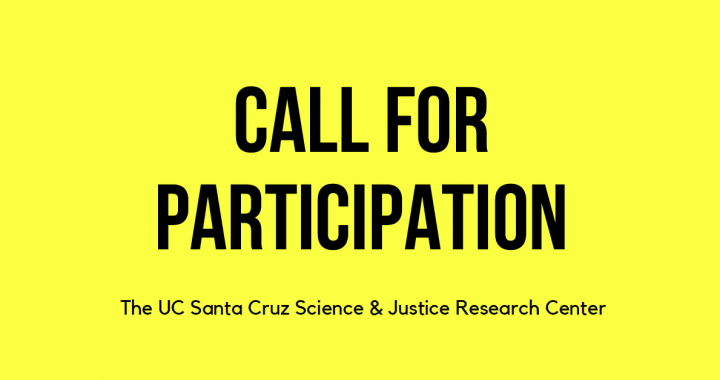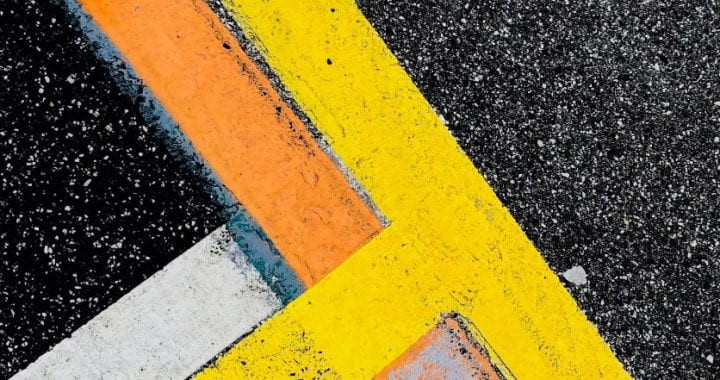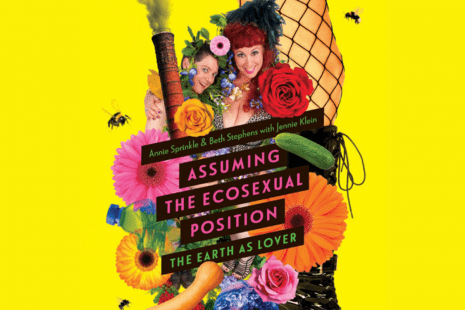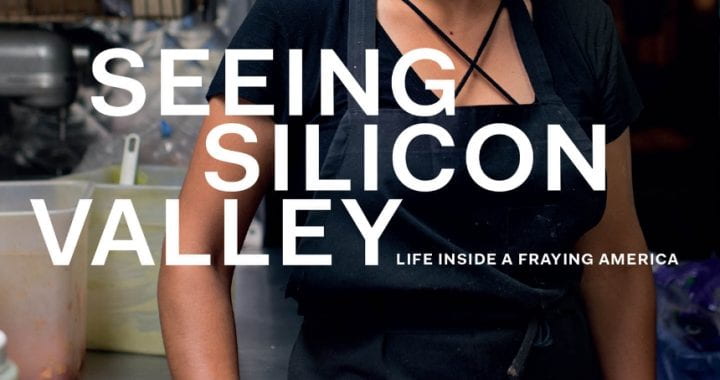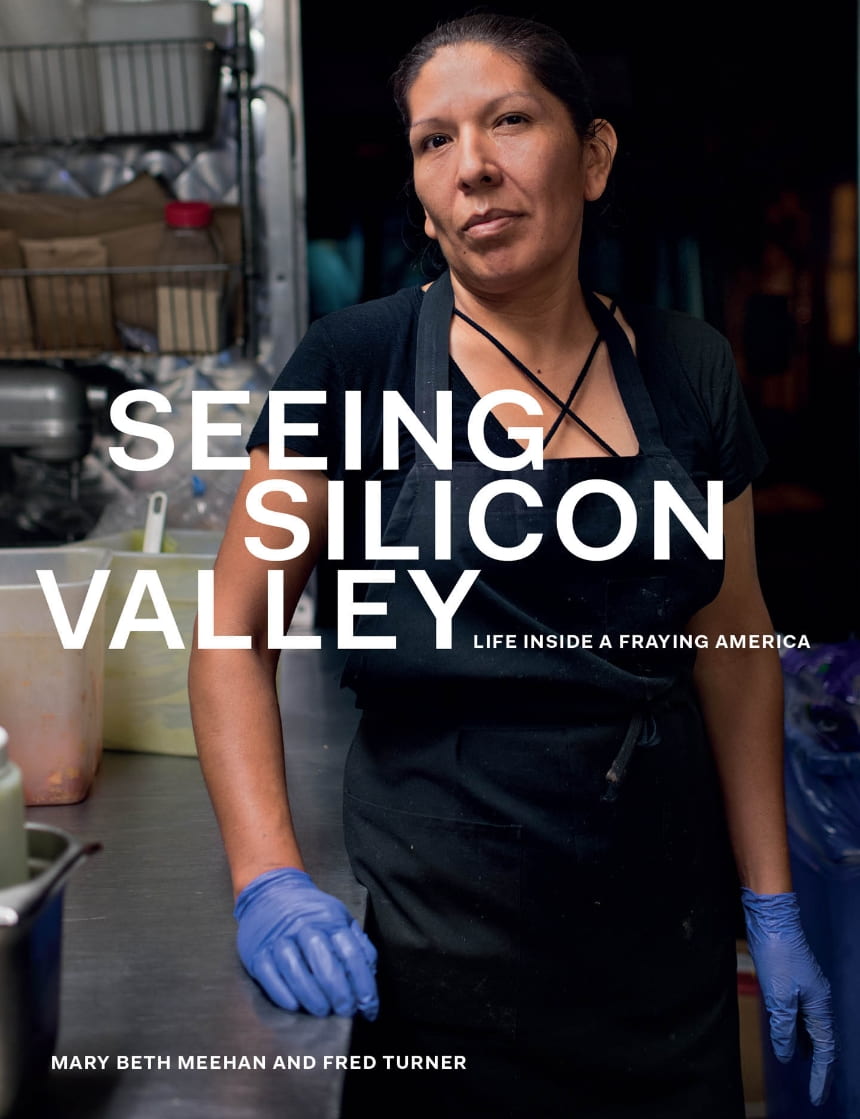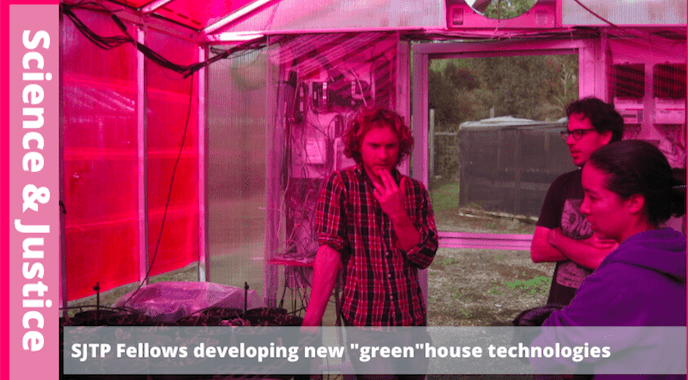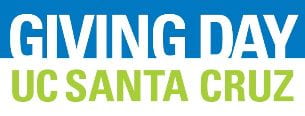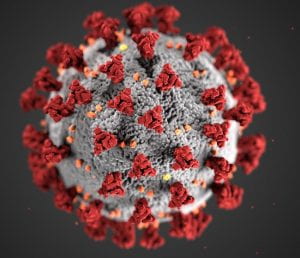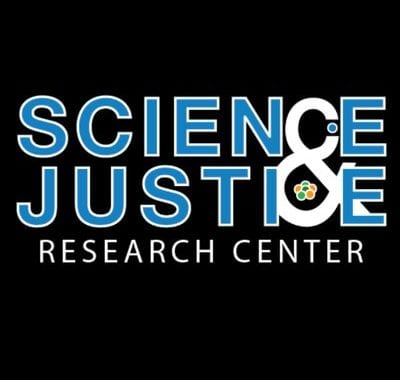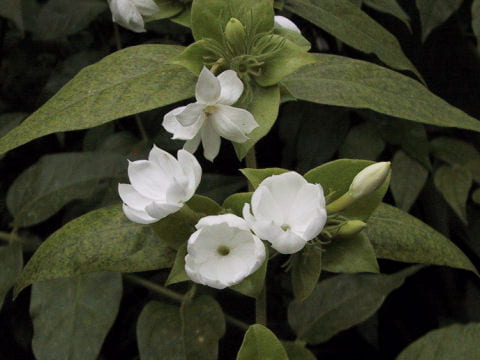Volume 13
Director’s Letter: Welcome to Science & Justice
This was a challenging year. Fires, the strike, and the syndemic of COVID-19 and racial violence affected all of us, both here at UCSC and beyond. While there was much that was simply difficult and devastating, the year also found the Science & Justice community coming together in novel and moving ways. Our undergraduate and graduate students inspired us as they worked together to interview members of our community nationally and internationally about how to reworld towards justice in the middle of converging crises. These interviews are being compiled into a podcast series that will air on our local radio station, KZSC, and is a central part of our larger Pandemicene Project. Our community also continued its research on health care in institutions of incarceration, but in the context of the outbreaks of COVID-19 among inmates across the nation, we expanded our work from from the local Santa Cruz jail to the prison system across the country. Our Theorizing Race After Race Working Group also launched a series of Dialogues on COVID-19 and Racism hosted on the UC Humanities Research Institute blog, The Foundry. Our Just Biomedicine Research Collective published its first essay in Counterpoints: A San Francisco Bay Area Atlas of Displacement and Resistance (PM Press, 2021). Finally, we launched a new research initiative with our colleagues in Biochemistry that aims to create just and accessible forms of RNA therapeutics, as well as proposed a bold new initiative with our long-time collaborator (and current President of the Social Science Research Council), Alondra Nelson, to create a new subfield of bioethics that places justice and social science insights at is heart.
This year also marked the 10 year anniversary of our Science and Justice Training Program! In the Winter, 11 students from across the Humanities, Social Sciences, Physical and Biological Sciences, Arts, and Engineering took the core class, Science and Justice: Experiments in Collaboration. With the UC Davis Feminist Research Institute (FRI) we concluded a seed fund grant awarded in 2019 from CITRIS and the Banatao Institute to compare the UCSC and UCD graduate training programs that center issues of gender, race, and social justice in science and engineering curriculums. Our curricular work also expanded this year to the undergraduate teaching as we began planning to launch a Science and Justice Minor.
The work of Science & Justice continues to be in the headlines, making a critical difference in California, the nation and globally. Our faculty and students were out front both in the press, and in their many newly published books and podcasts, addressing pressing issues, including public trust in science and medicine, bias and algorithms, and access to COVID-19 vaccines. Our research was supported by the National Science Foundation, CITRIS and the Banatao Institute at the University of California, as well as UC Santa Cruz seed funding initiatives.
Our events continue to highlight the unusual and inspiring collaborations and conversation Science & Justice creates. Highlights this year included an on-campus forum and public course, Forensic Genomics for Investigators, and the community event hosted at the Kuumbwa Jazz Center in downtown, Santa Cruz, “Racial Reconciliation and the Future of Race in America.”
Visitors and participants continue to visit us from all over the nation and world, including over the last year from Canada, Denmark and universities throughout the United States, helping us to continue to grow Science & Justice as a space for national and transnational research and thinking.
As we look forward to the year to come, we appreciate this chance to pause and to share with you our accomplishments of the last year.
Jenny Reardon
Founding Director of the Science & Justice Research Center, Professor of Sociology at UC Santa Cruz
Science & Justice Leadership Team
Founding DIRECTOR and DIRECTOR of Teaching the SJTP | Jenny Reardon, Professor of Sociology
CENTER MANAGER | Colleen Stone
GRADUATE STUDENT RESEARCHER | Dennis Browe, UCSC Sociology
Science & Justice Steering Committee
Jennifer Derr, Associate Professor of History
James Doucet-Battle, Assistant Professor of Sociology
Lise Getoor, Professor of Computer Science
Jaimie Morse, Assistant Professor of Sociology
Jenny Reardon, Professor of Sociology
Matt Sparke, Professor of Politics
The Science & Justice Mission
The Science & Justice Research Center at the University of California, Santa Cruz is a globally unique endeavor that innovates experimental spaces, engages in collaborative research practices, and fosters emerging alliances between seemingly disparate sectors, disciplines and communities. Biomedical innovation, species extinction, toxic ecologies, healthcare reform, and many other contemporary matters of concern provoke questions that traverse multiple intellectual, institutional and ethico-political worlds. Science & Justice generates modes of inquiry and empirically rigorous research that address these enormous challenges and support livable worlds. The Center is home to the Science and Justice Working Group, graduate training programs and sponsored research projects. The initiative builds on the UCSC campus’ historic commitments to socio-ecological justice and strengths in science studies and interdisciplinary research.
Sustaining a Vibrant SJRC Community
The Science & Justice Research Center is the home of a vibrant, collaborative community. Located in Oakes College, SJRC hosts visitors from across the UC system and around the world. The SJRC community is committed to sustaining an experimental ecosystem for novel ideas, dialogues, methods and collaborations. The Science & Justice Working Group remains the heart of our collective work. We also host regular reading groups and experimental mixers with affiliated graduate students and faculty who seek to further investigate the meanings and practices of science and justice.
Visiting Scholar Program
Since 2009, the SJRC Visiting Scholars Program has been a vibrant hub for interdisciplinary scholars across the UC-system, the nation and the globe. The Science & Justice Research Center offers opportunities for visiting scholars at all levels of their career (regardless of institutional affiliation) to participate in the community through research collaborations, reading groups and experimental mixers. In the 2019-2020 academic year, the Center hosted six visiting scholars and supported one Fulbright application for the coming academic year: refer to Appendix 1 to learn more about them.
Highlights from the Science & Justice Working Group, Experimental Mixers, Writing and Reading Groups
The Science & Justice Working Group (SJWG) provides a convivial and novel space to cultivate emerging connections, spark new questions for research, and nurture our communities’ collaborative ties. In addition to formally convening the SJWG, our informal experimental mixers are a lively and open space for all SJRC community members. Here are some highlights of the year’s events (all events are listed in Appendix 2).
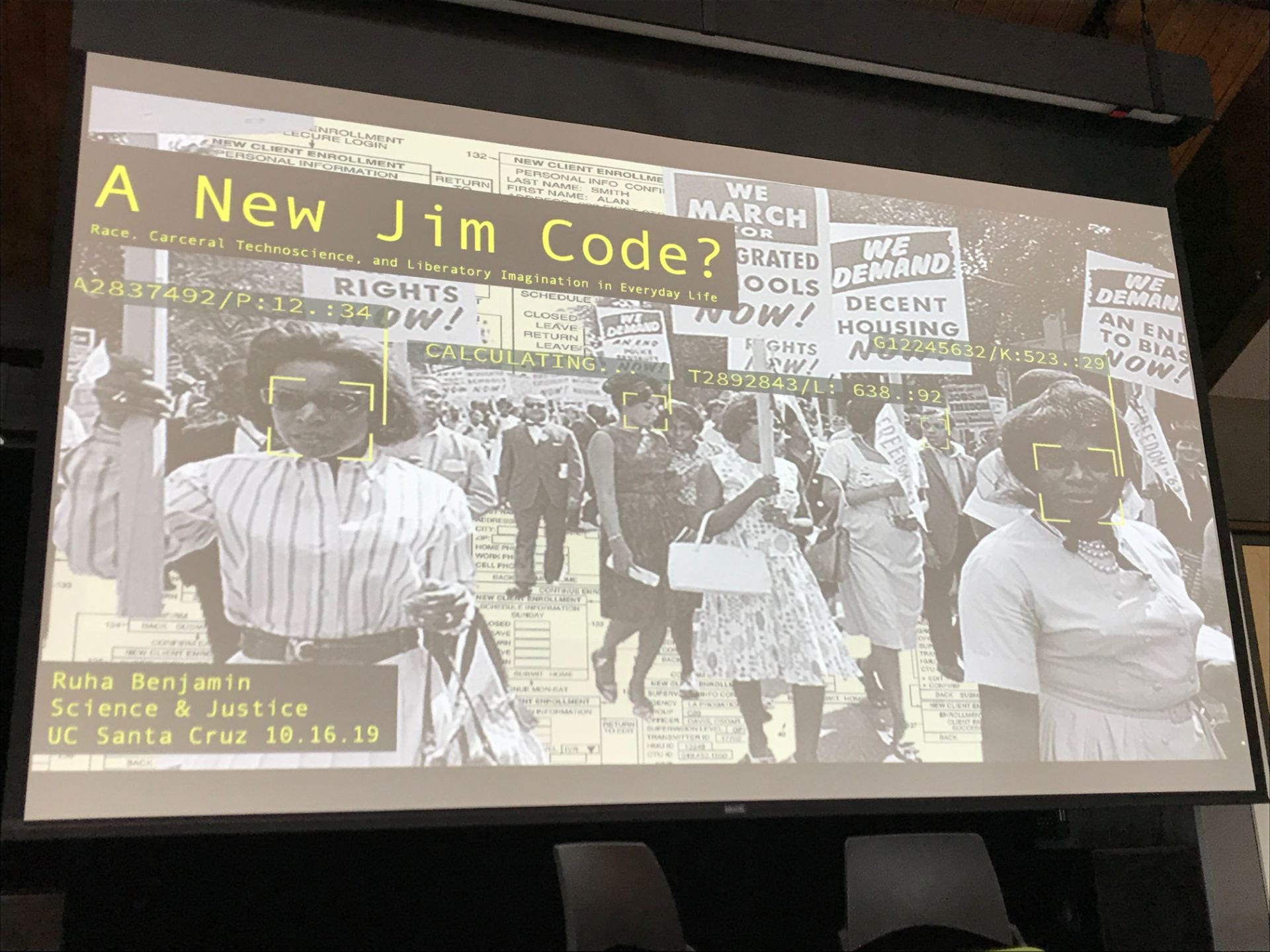
A New Jim Code, a talk by Ruha Benjamin
On October 16, the Center began the 2019-2020 academic year by hosting Ruha Benjamin, a sociologist and Associate Professor in the Department of African American Studies at Princeton University, to discuss A New Jim Code?, the interconnections between race and technology, and the potential for bias and discrimination that lies in algorithms and coding. A rapporteur report by SJRC Graduate Student Researcher, Dennis Browe can be found at: https://scijust.ucsc.edu/2019/10/16/oct-16-ruha-benjamin/.
Sociology graduate student Luz Cordoba kicked off the Works-in-Progress Series on October 30 by presenting on her exploration of giant bamboo forests and their harvesters in Colombia, South America.
The annual Meet & Greet was rescheduled to November 06 due to PG&E power cuts. Learn more in our developing story Private Utility, Public Safety? On PG&E’s Energy Shutoffs. In addition to a chance to celebrate the new academic year and enjoy each other’s company over food and drink, the annual gathering is always a great chance to welcome new members, welcome back others, and share current work to foster emerging collaborations. Refer to Appendix 4: SJRC Publications and Awards for a full list of books celebrated at the Meet & Greet.
On November 21, SJRC hosted a campus visit with colleagues Jessica Kolopenuk (Assistant Professor at the Faculty of Native Studies, University of Alberta and Ph.D. Candidate in the Department of Political Science at the University of Victoria) and Kim TallBear (Associate Professor, Faculty of Native Studies, University of Alberta, and Canada Research Chair in Indigenous Peoples, Technoscience & Environment). They are building a research hub in Indigenous Science, Technology, and Society (www.IndigenousSTS.com) and spoke with SJRC about developing a collaborative training grant partnership. Their public talk was co-hosted with the Crown College Core Course (Ethical and Political Implications of Emerging Technologies). TallBear provided an introduction on Indigenous STS and Kolopenuk presented a talk titled, “Visions of Star Women: A Cree Theory of Canada’s National Missing Persons DNA Program.” The event was co-sponsored by the Baskin Engineering Council on Diversity, Equity, and Inclusion, the American Indian Resource Center, the Human Paleogenomics Lab, The Humanities Institute, the Santa Cruz Institute for Social Transformation, the departments of Anthropology Feminist Studies, History of Consciousness and Sociology, and UCSCs Women in Science and Engineering.
In the Winter, SJRC hosted Social Science Research Council President Alondra Nelson for a campus visit. On January 21 Nelson presented a Works-in-progress at the Louden Nelson Community Center in downtown Santa Cruz titled, “Even a Moon Shot Needs a Flight Plan: Genetics and Ethics in the Obama Administration”.
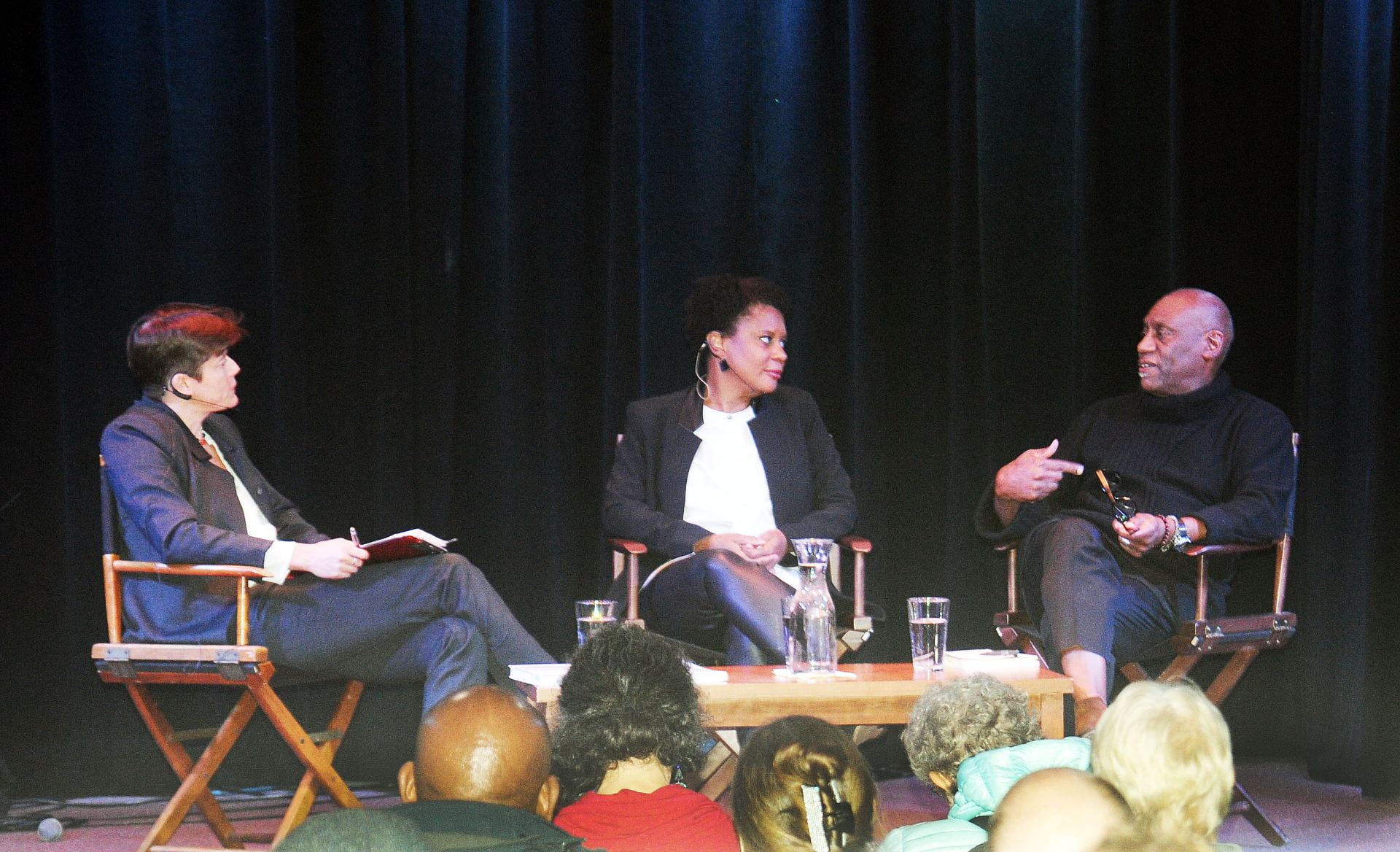
“Racial Reconciliation and the Future of Race in America” with Jenny Reardon, Alondra Nelson, and Herman Gray.
The following day on January 22, the community joined us at the Kuumbwa Jazz Center in downtown, Santa Cruz for a vibrant, stimulating, and challenging conversation on “Racial Reconciliation and the Future of Race in America” with Alondra Nelson and Herman Gray (Emeritus Professor of Sociology, UC Santa Cruz) as moderated by SJRC Founding Director Jenny Reardon (pictured).
The conversation included an array of themes including genealogy and genetic ancestry testing; reparations; our polarized nation; the term ‘post-racial’; and the status of the social sciences today. A rapporteur report by SJRC Graduate Student Researcher Dennis Browe can be found at: https://scijust.ucsc.edu/2020/01/22/race-in-america/.
On May 29, we hosted an on-line event, Engineering in the Public Good in the Age of COVID-19. The discussion was co-hosted by SJRC and the Baskin School of Engineering. We explored how to create at UCSC the institutional practices and structures needed during the COVID-19 pandemic to not just develop essential technologies (e.g., COVID-19 rapid testing), but also their successful movement out of the laboratory and into society. The dialogue was attended by several faculty in both Engineering and Science and Justice, as well as outside speakers who brought to the table relevant expertise (e.g., in public communication; collaborative research across the social sciences and engineering). Several ideas were developed for future collaborative work between Science and Justice and Engineering.
Justice Sparks Innovative and Original Research
The Science & Justice Research Center continues to be an exemplar of how to transform commitments to justice into collaborative research projects. We formulate new methods and institutional practices where scientists and engineers work alongside social scientists, humanists, ethicists, artists and diverse public communities. SJRC affiliates pursue local, regional, national, and international research collaborations on issues that inform and affect institutional and public policy.
Towards A Sociology of Bioethics
In Spring 2020, the Science & Justice Research Center in collaboration with the Princeton Institute of Advanced Study applied for a Wellcome Trust Research Development Award in Humanities, Social Science and Bioethics with a proposal entitled, “Toward a Sociology of Bioethics.” Led by co-PIs Alondra Nelson and Jenny Reardon, the goal of the project is to create a new field of bioethics. In late Spring the proposal was selected as one of 16 finalists from a pool of 112 applicants asked to submit a final application for the million pound grant scheme. If awarded, the SJRC and IAS will recruit postdoctoral fellows, graduate and undergraduate students, and convene national and international scholars and practitioners to begin laying out an agenda and original research for a bioethics that places social sciences at its heart, and justice as its core principle.
The Pandemicene
In the Spring 2020 term, as we all tried to respond to and reorient activities to respond to the pandemic, the SJRC launched The Pandemicene: Re-worlding Towards Justice. The project began from the premise that creating trust-worthy knowledge that can foster a more just world requires attending to both COVID-19 pandemic and the deep inequalities and fissures in the polity that this pandemic has laid bare (see the campus news article, “Discrimination, governance, and trust in the age of COVID-19”, featuring SJRC Founding Director Jenny Reardon). Amid the crisis, our particular commitment at Science & Justice remained to help build spaces where our partners and friends from around the planet could think and re-world together.
As announced on our website, the Center collected resources for teaching about COVID-19, open response letters, calls to action and online community events and information about the following areas:
- Re-Worlding: Living and Learning Alone Together in the Pandemicene
- Community, Civil Society and Social Justice Responses to COVID-19
- Just Biomedicine in an Age of COVID-19: How Can Researchers (Public Health, Genomics, Virologists, Bioethicists) Collaborate in New Ways?
- The Challenges of Knowing and Responding in the Age of No Data and Mis-information
- The Crisis of Public Health in Infrastructures of Care and Incarceration
Additionally, Director Reardon designed a group tutorial and an undergraduate independent study seminar SOCY 194: Living and Learning in a Pandemic: The Sociology of COVID-19, that drew upon insights from the Sociology of Medicine, Science and Technology Studies, Feminist Studies and Critical Race Theory to study the current pandemic, COVID-19.

The SJRC Pandemicene Podcast Series
Students from that group tutorial and independent study, under the guidance of Reardon and SJRC graduate student Lucia Vitale (Politics) produced a blog series, a zine. Over Summer 2020, students with Dennis Browe (Sociology), Paloma Medina (Biomolecular Engineering), and Dorothy Santos (Film & Digital Media) designed a podcast series with critical conversations among our collaborators here and around the world about how their foci had and had not changed during the pandemic, and how– practically–to re-world towards justice at this critical historical juncture. 9 episodes were set to air on KZSC 88.1FM and Spotify over Fall term.
Comparative Analysis of Interdisciplinary Training for STEM Scholars
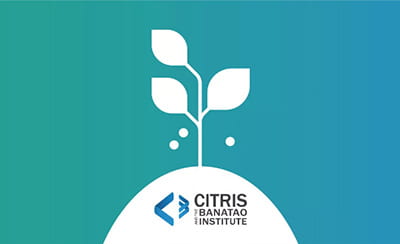
CITRIS and the Banatao Institute at the University of California
With colleagues at the UC Davis Feminist Research Institute (FRI) SJRC concluded a seed fund grant awarded in 2019 from CITRIS and the Banatao Institute at the University of California under “2019-0112: Comparative Analysis of Interdisciplinary Training for STEM Scholars”. This grant enabled the hiring of a doctoral student at each campus tasked with ethnographic and observational data collection throughout the duration of the 2019-2020 seminars and analysis of comparative data between the seminars after their completion. The major research questions being addressed focused on:
- student recognition of societal context for research (potential bias and societal needs),
- a culture of inclusion for those underrepresented in STEM fields,
- interdisciplinary collaborations, and
- the ability to accurately and appropriately use categories in research (e.g. gender, race).
More at: SJTP concludes a comparative cross-campus review of graduate curriculum that make questions of gender and social justice fundamental to STEM training.
Center for Open Access Splicing Therapeutics (C.O.A.S.T.)
In Spring, SJRC with faculty colleagues Michael Stone (Chemistry) and Jeremy Sanford (MCDBio), was awarded $75,000 of seed funding by the Office of Research and PBSci Dean Koch allowing us to plan the UCSC Center for Open Access Splicing Therapeutics (C.O.A.S.T.). The goals of C.O.A.S.T. is to accelerate the discovery of precision therapies for rare diseases by exploiting the chemical language of ribonucleic acid (RNA), coupled with a deep commitment to understanding and addressing the questions of ethics and justice raised by this novel area of research.
Incarcerated Care
The Incarcerated Care project aims to amplify the voices of those incarcerated who face challenges receiving health care. The project produced an interactive documentary website on COVID-19 in prisons and jails overseen by Film & Digital Media Professor Sharon Daniel who, with SJRC Founding Director Jenny Reardon and Psychology graduate student Roxy Davis, also piloted a community initiated investigation into the conditions of health care in the Santa Cruz County jails after a series of preventable deaths. The 2019 preliminary study (funded by the UCSC Blum Center on Poverty, Social Enterprise and Participatory Governance) involved 14 semi-structured interviews with formerly incarcerated people and service providers in community health agencies. Undergraduate Priyanka Kulkarni (Sociology, Oakes) wrote a thesis on the project overseen by SJRC affiliate and Professor of Sociology James Doucet-Battle.
Supporting Undergraduate and Graduate Research
Over the Summer of 2020 SJRC awarded 5 undergraduate student researchers (totaling $ 3000.55) and 7 graduate student researchers (totaling $19,000) funds to conduct original and collaborative research. The award is intended to support general living expenses, fieldwork or travel (as allowed by COVID-19 and shelter-in-place restrictions), presentation of work, and/or research.
For a complete list of the ongoing research our community conducted, refer to Appendix 3.
Creating a UCSC Ethics in Practice Curriculum
At an increasing rate, many forms of scientific evidence are met not just with questions of curiosity and interest, but also with skepticism and mistrust. Healthcare systems are challenged by entrenched inequalities and profit motives. Algorithms encode bias into the heart of big data approaches to science and engineering. The next generation of leaders in biomedical and life sciences, environmental science, and engineering need to be adept at addressing these challenges. At SJRC, we believe this requires bold new approaches to ethics and research practice in STEM fields. We strive to exceed narrow standards for the ethical approval of science and prepare our students to be powerful stewards of socially robust and reflexive science. Our vision of good science exceeds simple compliance and strives towards institutional change. We work with affiliate faculty to realize this in practice.
 Providing students with the training to recognize and address contextual issues, including biases, was the focus of SJRCs year-long work with visitor Cris Hughes (Assistant Clinical Professor, University of Illinois at Urbana-Champaign and UCSC alum). Hughes worked closely with the SJRC (in particular, program manager Colleen Stone) to create and coordinate a 1-day workshop approved as an accredited continuing education course for California investigators through the state Commission on Peace Officers Standards and Training (P.O.S.T.). The course was open to those working in professions where having an up-to-date grasp of genomic technological applications is imperative (eg: police, nurses). The course, “Forensic Genomics for Investigators,” was offered at the Santa Cruz County Sheriff’s Office on November 12, 2019. 32 people attended.
Providing students with the training to recognize and address contextual issues, including biases, was the focus of SJRCs year-long work with visitor Cris Hughes (Assistant Clinical Professor, University of Illinois at Urbana-Champaign and UCSC alum). Hughes worked closely with the SJRC (in particular, program manager Colleen Stone) to create and coordinate a 1-day workshop approved as an accredited continuing education course for California investigators through the state Commission on Peace Officers Standards and Training (P.O.S.T.). The course was open to those working in professions where having an up-to-date grasp of genomic technological applications is imperative (eg: police, nurses). The course, “Forensic Genomics for Investigators,” was offered at the Santa Cruz County Sheriff’s Office on November 12, 2019. 32 people attended.
Creating professional development courses such as this one provides a way to communicate work done within the university to practitioners and those directly working in forensics. After the workshop, there was a chance to discuss the course, as well as the issues it covered at the December 03, on-campus event “Forensic Genomics: New Frontiers and New Considerations.” Speakers at the event included Hughes with Bridget F.B. Algee-Hewitt (biological anthropologist at Stanford University who studies skeletal and genetic trait variation in modern humans), Ed Green (Associate Professor of Biomolecular Engineering at UCSC and principal investigator for the Paleogenomics lab), Lars Fehren-Schmitz (physical anthropology professor at UCSC and principal investigator for the Human Paleogenomics lab).
During summer, as protests arose throughout the country, Santa Cruz’s City Council then became the first in the U.S. to give the greenlight to ban predictive policing and facial recognition.
Learn more about our work in this domain in our developing story, Forensic Genomics, Surveillance, and Ethics.
Science & Justice Training Program
Science & Justice Graduate Training Program
The SJRC is the home to the globally unique Science & Justice Training Program (SJTP). The program teaches graduate students from across all five divisions how to collectively address the moments where questions of science meet questions of justice. We not only teach why it’s important to collaboratively ask questions, but also propose when and how to ask these questions.
Started in 2010 with a grant from the National Science Foundation, the Science & Justice Training Program (SJTP), celebrated its 10th anniversary in the Winter 2020 term. SJRC Founding Director Jenny Reardon taught the introductory course of the training program Science & Justice: Experiments in Collaboration. The seminar draws together masters, early career PhD students and faculty from across all five Divisions. Fostering experimental and innovative practices for working together, the class offers a unique opportunity for graduate students from engineering, natural sciences, social sciences, humanities, and arts to learn to labor together to understand and address critical issues.
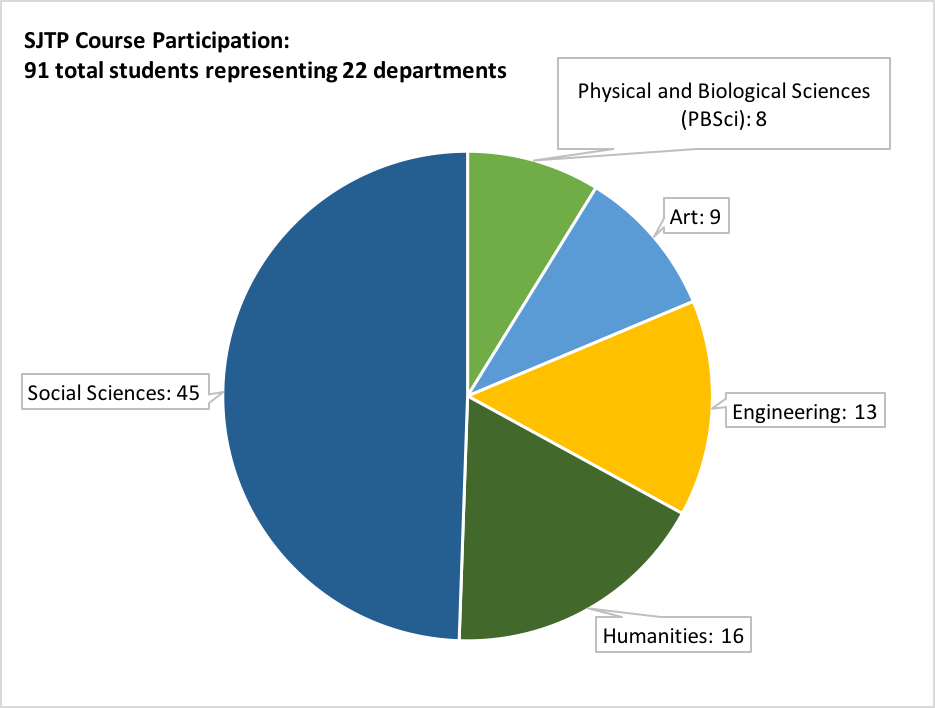
SJTP Course Participation
Over the last ten years, the introductory course for the Science & Justice Training Program has trained 91 graduate students representing 22 different UC Santa Cruz departments in creative approaches to science and justice. Participating in the program helps students build their careers and catalyzes new collaborative initiatives within the university. Our students have already had considerable early career success, demonstrated by their successful applications for fellowships, grants, postdoctoral positions and entrepreneurial efforts.
As Training Program students graduate, they take the skills and experience they gained in the program into the next stages of their careers in universities, industry, non-profits, and government. For example, founding Training Program Fellow, Tiffany Wise-West continues to stay active in the community as the sustainability and climate action manager for the City of Santa Cruz Climate Action Program. Over the summer, Wise-West participated in an interview with Off the Lip Radio hosted by Santa Cruz Waves.
Building off the success of their May 2019 SJTP event, “The Futures of Critical Food Studies,” SJTP fellow and graduate student Erica Zurawski (sociology) hosted the first session of the Graduate Association for Food Studies (GAFS) Reading Collective meeting. They discussed the SJTP event keynote speaker Ashanté Reese’s (Sociology and Anthropology, Spelman College) new book Black Food Geographies (UNC Press 2019). Zurawski, GAFS Co-President, organized the collective, and it meets the second Wednesday of every month starting in January 2020. More can be found at: https://gradfoodstudies.org/reading-collective/.
A Model for Interdisciplinarity
During their November visit, SJRC Advisor Kim TallBear (UCSC HistCon, Associate Professor, Faculty of Native Studies, University of Alberta, and Canada Research Chair in Indigenous Peoples, Technoscience & Environment) with UofA colleague, Assistant Professor Jessica Kolopenuk, met with SJRC Founding Director Jenny Reardon and Center Manager Colleen Stone to discuss the SJRC Training Program and potential grant opportunities with SJRC to develop a similar program at the University of Alberta. Over the past two years, they have co-developed an Indigenous Science, Technology, and Society Research hub and Training Program (www.IndigenousSTS.com) at the University of Alberta. We look forward to future collaborations.
Building Science and Justice Undergraduate Curriculum
UC Santa Cruz offers a wide range of courses across its many disciplines that address the relationships between science, society and justice. Science & Justice affiliates have long desired to create a large core course that would teach undergraduates the fundamentals of Science and Justice. Over this last year, SJRCs Steering Committee discussed the potential for creating a minor in Science and Justice. A Science & Justice minor could offer students an opportunity to learn the transdisciplinary field of science and justice studies while at the same time receiving training in their major discipline. The heart of the minor would be an interdisciplinary introductory course, Introduction to Science & Justice. SJRC will continue to gather faculty to discuss and conceptualize a proposal for a minor in Science and Justice.
In Spring, Science & Justice with James Doucet-Battle (lead), Jenny Reardon, Camilla Hawthorne and Colleen Stone worked with the Genomics Institute’s Angela Brooks and Zia Isola to coordinate submission of two applications for UCOP-funded HBCU Summer Undergraduate Training Programs. This entailed incorporating a novel Genomics and Justice component into each training program while creating a professional development pipeline for undergraduate HBCU students to apply and attend graduate school at UCSC to study genomics and society. While neither were awarded, we continue toward realizing the goals of the project.
Collaborating with Global and Community Health
We also continued to help support curricular projects of broad interest to the University. In Winter, our long-standing efforts to address campus pre-health curriculum resulted in a Global and Community Health (GCH) recruitment to select two candidates to hold tenure-track appointments. With department managers in Politics and Sociology, Center Manager Colleen Stone organized a six-person “online campus visit” for the division-wide recruitment which resulted in both candidates (Naya Jones and Alicia Riley) accepting positions within the Sociology Department. Both are expected to contribute towards the development and teaching of global and community health with a focus on health data and social justice that the Center will continue to help foster.
Funding the Future of Science & Justice
Director Jenny Reardon and Manager Colleen Stone continued to work closely with University Relations and Development Officers to develop strategies for funding the future of science and justice at UC Santa Cruz.

SJTP Fellows Ian Carbone and Derek Padilla with
undergraduate Artist-in-Residence Kiko Kolbi inside greenhouse
We developed a Giving Day campaign to support SJTP Fellows (pictured), case statements and concrete fundraising goals for the research center and the graduate training program. Our immediate grant-writing and fundraising goals include fellowship support for the Science & Justice Training Program graduate fellows, and support for Center staff and faculty. With the support of the SJRC Steering Committee, we will continue to pursue grants to support the Center’s collaborative research, training and advocacy activities.
Additional grant funding and donor contributions will secure our efforts to build an internationally recognized program that trains the next generation of scholars to responsibly take up the important social and scientific problems of our time. Higher levels of grant writing support will help us to develop our research infrastructure and our ability to obtain large-scale grants. As the Center prepares to seek funding to support the re-structured Center, we hope to spread current campus commitments more evenly among units and divisions to holistically support the Center.

Our ambitious fundraising goals and sustained efforts to pursue grant and foundation funding will continue the growth and vitality of our work and community.
During their January 2020 visit, SSRC President Alondra Nelson, met with SJRC Founding Director Jenny Reardon, Center Manager Colleen Stone, and members of the executive board of the Institute for Social Transformation to discuss the current state of social science research funding. Nelson provided insight on how the Center can seek resources and support. As we look to the future, we seek to continue to build SJRC as a hub for extramural funding of research projects with links to science and justice.
To support the next iteration of the Science & Justice Training Program, to be offered in Winter 2022 by Affiliated Faculty and Assistant Professor of Sociology James Doucet-Battle, and in celebration of his new book “Sweetness in the Blood: Race, Risk, and Type 2 Diabetes“, SJRC plans to host a book launch and fundraiser in Spring 2021.
Reflecting on Our Progress and Looking Ahead
The 2019-2020 academic year marked the end of our eighth year as a research center. The SJRC has become a dynamic and collaborative infrastructure for training the next generation of humanities, natural and social science researchers who will still be trained and supported to pursue their research and make discoveries, but will do so in purposeful ecosystems where ethics and justice are primary concerns. As campus administrative and academic leadership continued to shift, the Center and its affiliated faculty remained key partners in forming responses to the future of training, curriculum, and research across campus. In particular, we continued to deepen our collaborations with our colleagues in Science and Engineering, particularly through the COAST and HBCU Summer Undergraduate programs; and our colleagues in Critical Race and Ethnic Studies to develop an undergraduate minor in Science and Justice.
Reflecting on our progress, growth and the challenges ahead, we continue to refine Center practices, and document them in the SJRC Handbook. Center Manager, Colleen Stone continued to meet with Founding Director Jenny Reardon and Sociology Department Manager Jessica Lawrence to better understand and delineate responsibilities of administrative tasks related to running the Center. Reardon and Stone also continued working with the Baskin School of Engineering to envision specific ways in which SJRC and BSOE faculty and students can engage, and how the Center can provide effective support to the educational and research efforts of our diverse faculty community.
We are committed to developing future research collaborations, and seek collaborators from all divisions and the UC system, and community. We will continue to provide a critical and dynamic space for the intellectual, organizational and moral support of the diverse needs of our faculty, researchers, students, and staff.
As we look to the year ahead, we look forward to welcoming and working with our new colleagues, Tamara Pico (Earth and Planetary Sciences) and Kathleen Gutierrez (History) to conceptualize cross-divisional teaching, and to engaging in deep discussions and research planning with our colleagues Michael Stone (Biochemistry) and Jeremy Sanford (MCD Biology) as we seek to develop just forms of RNA Therapeutics.
SJRC’s promise is simple and bold. The benefits are manifold: improved outcomes not just for humans, but for the many non-human lives as well; approaches to science and technology that balance prosperity and justice, health, ecological survival and ethics. Our affiliated researchers and interdisciplinary teams have built decades of scholastic expertise examining the life sciences and biomedicine, health, environment, food, and racial and economic justice. The Center provides the critical milieu in which the creative sharing of this expertise leads to novel justice praxis and knowledge sharing that fosters and supports diverse lives and futures.
Thank you for making a more just world possible!
Appendix 1: Visiting Scholars
Melissa Eitzel Solera | National Science Foundation Postdoctoral Science, Engineering and Education for Sustainability Fellow, Sociology (through June 2021)
Iben Gjødsbøl | Fulbright Fellow, Assistant Professor at the Centre for Medical Science and Technology Studies, Department of Public Health, University of Copenhagen, Denmark (Winter 2020)
Cris Hughes | Assistant Clinical Professor of Anthropology, University of Illinois at Urbana-Champaign (Fall 2019)
Joseph Klett | Research Fellow, Science History Institute (through Spring 2020)
Karina Rider | PhD Candidate, Sociology, Queen’s University (Ontario, Canada) (through Fall 2019)
Iris Yellum | PhD Candidate, South Asian Studies, Harvard University (through Winter 2020)
Appendix 2: Science & Justice Working Group (SJWG) Events, Experimental Mixers, and Reading Groups
Many 2019-2020 events overlapped with health, medicine, disease, and biotechnology; genomics and criminal justice; conservation and nature; race and identity; databases and fieldwork are attached with links for more information, they are linked below for more information.
October 16, 2019 | Ruha Benjamin on A New Jim Code?
November 6, 2019 | Science & Justice Training Program Informational Meeting
November 12, 2019 | Forensic Genomics for Investigators P.O.S.T. Course
November 21, 2019 | Visions of Star Women: A Cree Theory
November 21/22/23, 2019 | FrankenCon2019
December 03, 2019 | Forensic Genomics: New Frontiers and New Considerations
December 04, 2019 | Surrogate Humanity: Race, Robots, and the Politics of Technological Futures
January 21, 2020 | Even a Moon Shot Needs a Flight Plan: Genetics and Ethics in the Obama Administration
January 29, 2020 | Works-in-Progress with Anjuli Verma
February 05, 2020 | Locating the Central Asiatic Expedition + Book Discussion: Assembling the Dinosaur
May 29, 2020 | Engineering in the Public Good in the Age of COVID-19 (not open to public)
Appendix 3: Research Clusters & Projects
Theorizing Race After Race
Launched in 2018-2019 by SJRC Founding Director Jenny Reardon and SJRC affiliate and Assistant Professor of Sociology Camilla Hawthorne, the working group, Theorizing Race after Race (TRaR) continued seeking to develop a framework for grappling with reconfigurations of race after the supposedly ‘post-racial’ moment. Their goal is to understand how knowledge of the genome and ideas of human difference circulate, taking on different meanings across diverse historical-geographical contexts. The group convened several meetings throughout the academic year with campus scholars and developed a publication plan for 2020-21 including a series of dialogues on COVID-19 and Racism for the UCHRI Foundry website.
Queer Ecologies Research Cluster
Queer Ecologies is a group led by Training Program Fellow Paloma Medina. It met every other week to investigate how sexuality and concepts of nature have been historically linked. In particular, they are interested in how evolutionary and ecological science has informed what is “natural” and how we use this information to delineate certain sexual behaviors as normal or aberrant. Queer Ecologies seeks to examine the historical making of the natural as it relates to sexuality while communicating the overwhelming diversity of sex and gender in biology.
Just Biomedicine
Just Biomedicine is a UC Santa Cruz-based research collective that examines the meeting of biomedicine, biotechnology, and big data along the Third Street corridor in the Mission-Bay neighborhood of San Francisco. Many hope that this convergence will democratize access to health information and produce revolutionary new medical treatments that new companies will make available to the public through market mechanisms. Yet, as in other domains, living with technoscientific transformations over time reveals how they produce new inequalities and injustices: new challenges to democratic governance; new surveillance regimes; and new forms of social stratification.
Following the April 2019 meeting with the Pontifical Academy of Sciences at The Vatican designed to advise the Pope on the future of genomic medicine, SJRC Founding Director Jenny Reardon was featured in the UC Santa Cruz Magazine article on ‘Debates on the wild frontier of genomics reveal where the real frontier lies’. With Medical Ethicist Joseph J. Fins, Reardon published a bioethics forum essay ‘Hannah Arendt in St. Peter’s Square’ on October 14, 2019 at The Hastings Center. Here they discussed the need for building institutions that support the arts of collective judgment in science and medical education: “We must neither be seduced by the logicality of new technologies such as CRISPR nor dissuaded by the misapplication of unreflected-upon regulatory barriers? But how?”.
In January 2020, Reardon was elected as a fellow with The Hastings Center for informing scholarship and public understanding of complex ethical issues in health, health care, science, and technology. More information can be found in this campus news article. In May 2020 as part of The Hastings Center Special Report Volume 50, Issue S1 of For “All of Us”? On the Weight of Genomic Knowledge, SJRC Founding Director and Professor of Sociology Jenny Reardon published an article on ‘Why and How Bioethics Must Turn toward Justice: A Modest Proposal’.

UC Global Health Day, May 2020
On May 2, 2020 SJRC graduate student researcher, Dennis Browe (sociology), presented a poster for the online UC Global Health Day showcasing the work of the Just Biomedicine research cluster examining how other visions of health and healthcare become foreclosed and swept away by domineering visions of the future of medicine.
In June, Director Jenny Reardon was invited to be on the advisory board for the Center for ELSI Resources and Analysis (CERA). CERA is a new national center establishing a reliable online platform for scientists, scholars, policymakers, journalists and the general public to learn about the ethical, legal and social implications of genetics and genomics (ELSI) and fostering a community of multi-disciplinary researchers focused on ELSI research. CERA is funded by the National Human Genome Research Institute (NHGRI) at the National Institutes of Health (NIH) and co-led by the Stanford Center for Biomedical Ethics and the Division of Ethics at Columbia University in partnership with The Hastings Center and the Personal Genetics Education Project at Harvard University by Co-Principal Investigators Mildred Cho (Associate Director Stanford Center for Biomedical Ethics) and Sandra Soo-Jin Lee (Chief, Division of Ethics Department of Medical Humanities and Ethics at Columbia University).
The team plans to present on the project in the coming year at other academic institutions and professional academic associations. In Spring 2021, with Feminist Studies graduate Erin McElroy’s Anti-Eviction Mapping Project, the Just Biomedicine research cluster will launch Counterpoints: A San Francisco Bay Area Atlas of Displacement and Resistance (PM Press) that includes a contribution to a chapter titled “Just Biomedicine on Third Street? Health and Wealth Inequities in SF’s Biotech Hub”. This examines the different visions for health and healthcare that have been imagined and practiced along the Third Street corridor of San Francisco.
Socio-Ecological Justice
Visiting Scholar Melissa Eitzel Solera continued working with SJRC Founding Director Jenny Reardon and Ken Wilson (The Muonde Trust) to wrap up the NSF-funded project, “Understanding Resilience in a Complex Coupled Human-Natural System: Integrating Qualitative and Quantitative Information and Community-Based Action Research.” Dr. Eitzel Solera led the NSF-funded project involving a 35-year collaborative research project in rural Zimbabwe run by The Muonde Trust. Together with the community research team, they developed methods of modeling the resilience of their system and synthesizing their long-term data to answer pressing concerns about sustainable environmental management. They also made theoretical and practical contributions to more just modeling practices in an age of “big data.”
Dr. Eitzel Solera worked closely with SJRC scholars, including award-winning journalist Sally Lehrman, Andrew Mathews (anthropology), Katherine Weatherford Darling (University of Maine), and Jenny Reardon, for advice and feedback on theoretical framings for a manifesto, approaches to collaborative writing, and background on qualitative methods. With the support of the Center’s staff and affiliated scholars, the project was able to raise questions about more just and collaborative modeling from both theoretical and practical angles, contribute to a group of rural Zimbabwean researchers’ ability to define and address their own land management challenges with the tools of digital mapping and modeling, and apply these experiences to community-based citizen science in California. Their efforts were written up in an article accepted to Citizen Science: Theory and Practice (describing the modeling process).
Appendix 4: SJRC Publications and Awards
Buscando a Marla (Looking for Marla, Spanish Edition, 2020)
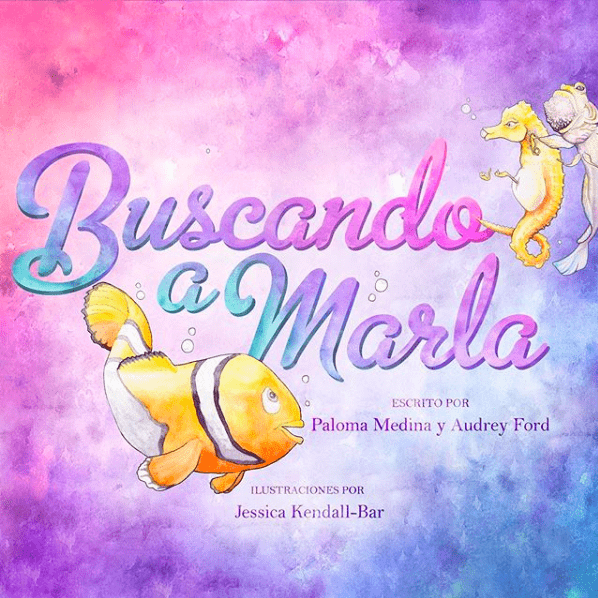
Buscando a Marla (Looking For Marla) in Spanish.
Science & Justice Fellow, BME graduate student Paloma Medina, expanded Marla’s story, translating the children’s book Looking for Marla – an illustrated tale of a clownfish in transition – into Spanish and releasing the edition as Buscando a Marla. A Buscando a Marla launch party was hosted on November 15, 2019, at the Santa Cruz Museum of Art and History in downtown Santa Cruz, with performances, face painting, brainstorming on the meaning of parenthood.
Read more in this campus news article and in this bilingual book launch article.
Fields of Gold: Financing the Global Land Rush (Cornell University Press, 2020)

Fairbairn’s Fields of Gold, Financing the Global Land Rush (Cornell University Press, 2020)
Fields of Gold critically examines the history, ideas, and political struggles surrounding the financialization of farmland. In particular, Science & Justice Affiliate, Assistant Professor in Environmental Studies Madeleine Fairbairn focuses on developments in two of the most popular investment locations, the US and Brazil, looking at the implications of financiers’ acquisition of land and control over resources for rural livelihoods and economic justice.
At the heart of Fields of Gold: Financing the Global Land Rush (Cornell University Press, 2020) is a tension between efforts to transform farmland into a new financial asset class, and land’s physical and social properties, which frequently obstruct that transformation.
More can be found in this campus news article:
The global land rush: How investors have turned farmland into a lucrative financial asset class.
The Lived Nile: Environment, Disease, and Material Colonial Economy in Egypt (Stanford University Press, 2019)
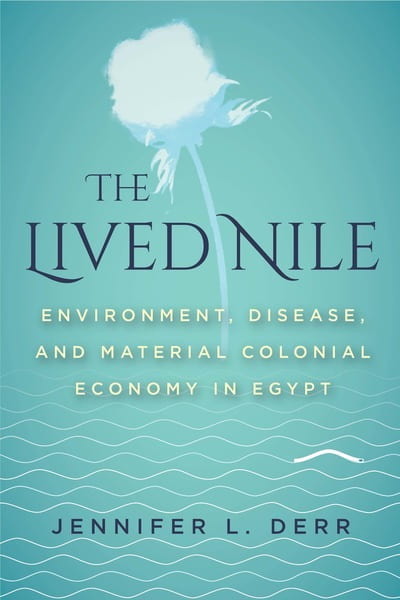
Derr’s The Lived Nile: Environment, Disease, and Material Colonial Economy in Egypt (Stanford University Press, 2019).
Science & Justice Affiliate, UC Santa Cruz Professor of History, Jennifer L. Derr, follows the engineers, capitalists, political authorities, and laborers who built a new Nile River through the nineteenth and early twentieth centuries. The river helped to shape the future of technocratic knowledge, and the bodies of those who inhabited rural communities were transformed through the environmental intimacies of their daily lives.
From the microscopic to the regional, the local to the imperial, The Lived Nile: Environment, Disease, and Material Colonial Economy in Egypt (Stanford University Press, 2019) recounts the history and centrality of the environment to questions of politics, knowledge, and the lived experience of the human body itself.
More can be found at: https://scijust.ucsc.edu/2019/07/01/derr-lived-nile/
Racism Postrace (Duke Press, 2019)
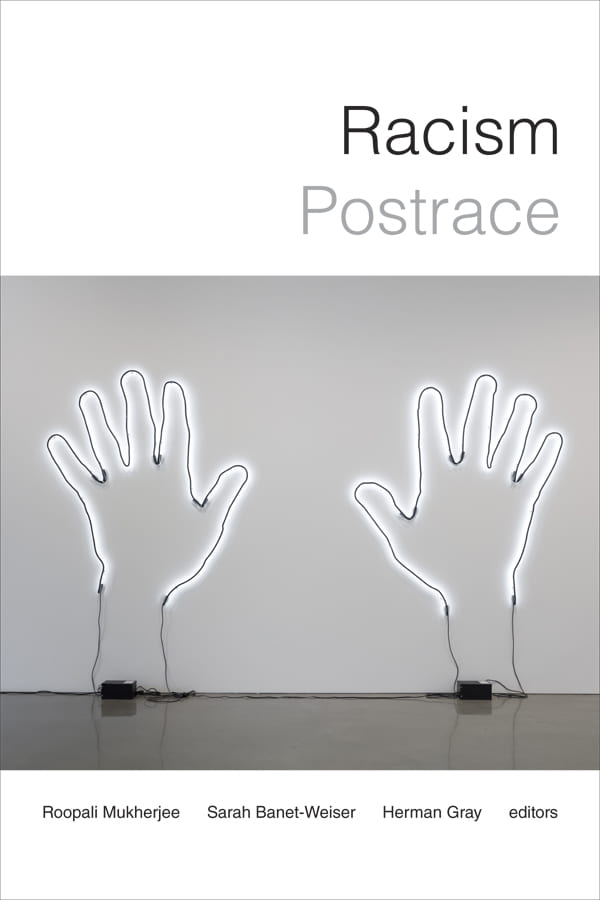
Gray’s Racism Postrace (Duke Press, 2019)
SJRC Advisor and Professor Emeritus of Sociology Herman Gray’s new book Racism Postrace (Duke Press, 2019) examines the concept of postrace and its powerful history and allure, showing how proclamations of a postracial society further normalize racism and obscure structural antiblackness.
They trace expressions of postrace over and through a wide variety of cultural texts, events, and people, from sports (LeBron James’s move to Miami), music (Pharrell Williams’s “Happy”), and television (The Voice and HGTV) to public policy debates, academic disputes, and technology industries. Outlining how postrace ideologies confound struggles for racial justice and equality, the contributors open up new critical avenues for understanding the powerful cultural, discursive, and material conditions that render postrace the racial project of our time.
More on the book’s contributors and introduction can be found at: https://scijust.ucsc.edu/2019/05/28/book-gray-racism-postrace/.
Reporting Inequality: Tools and Methods for Covering Race and Ethnicity, 1st Edition (Routledge, 2019)
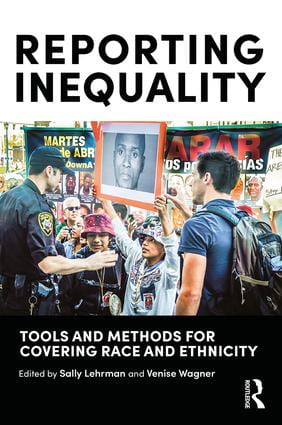
Reporting Inequality Tools and Methods for Covering Race and Ethnicity (Routledge, 2019)
Under increasingly intense newsroom demands, reporters often find it difficult to cover the complexity of topics that deal with racial and social inequality.
This path-breaking book, Reporting Inequality: Tools and Methods for Covering Race and Ethnicity (Routledge, 2019), by S&J Visiting Scholar Sally Lehrman, lays out simple, effective reporting strategies that equip journalists to investigate disparity’s root causes. Chapters discuss how racially disparate outcomes in health, education, wealth/income, housing, and the criminal justice system are often the result of inequity in opportunity and also provide theoretical frameworks for understanding the roots of racial inequity.
More can be found at: https://scijust.ucsc.edu/2019/04/18/lehrman-book-reporting-inequality/
Rock | Water | Life: Ecology and Humanities for a Decolonising South Africa (Duke University Press, March 2020)
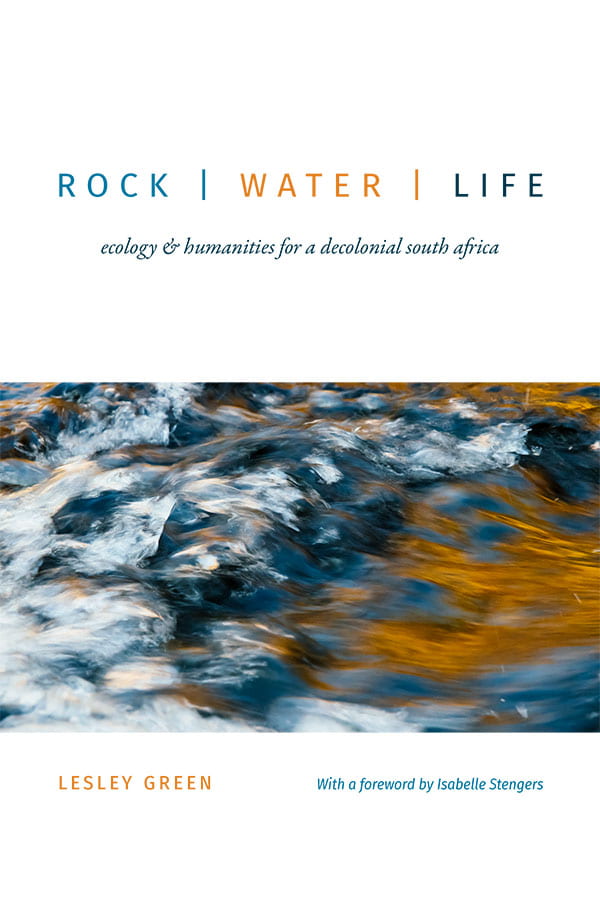
Rock | Water | Life: Ecology and Humanities for a Decolonising South Africa (Duke Press, 2020)
Following her 2017-2018 Fulbright Fellowship with SJRC, visiting scholar Lesley Green (Associate Professor of Anthropology in the School of African and Gender Studies, Anthropology and Linguistics; Faculty of Humanities; Director of Environmental Humanities South, University of Cape Town) authored Rock | Water | Life: Ecology and Humanities for a Decolonising South Africa (Duke University Press, March 2020). Green examines the interwoven realities of inequality, racism, colonialism, and environmental destruction in South Africa, calling for environmental research and governance to transition to an ecopolitical approach that could address South Africa’s history of racial oppression and environmental exploitation.
More can be found at: https://www.dukeupress.edu/rock-water-life
Sin Sol / No Sun

(c)Kristine Eudey, 2019, micha cárdenas, “Sin Sol, Prototype” as part of “Arch”, Leslie-Lohman Museum.
Created by the UCSC Critical Realities Studio Sin Sol / No Sun is an augmented reality game that allows users to experience the feelings of a climate change event, in order to deeply consider how climate change disproportionately affects immigrants, trans people and disabled people. Players can find, see and hear a story told through poetry about living through climate change induced wildfires, from an AI hologram, Aura.
Sin Sol’s game design, writing and direction was by SJRC affiliate micha cárdenas (UCSC assistant professor of Art & Design: Games and Playable Media) and produced by SJTP Fellow Dorothy Santos (Film and Digital Media).
Watch the trailer on YouTube and find more in this campus news article:
New art game explores intersection of personal trauma and climate induced wildfires
Sin Sol is available on the Apple App Store for iPhone and iPad.
The Software Arts (MIT Press, 2019)

The Software Arts (MIT Press, 2019)
In The Software Arts (MIT Press, 2019) SJRC Affiliate, Chair and Professor of Film and Digital Media Warren Sack provides an alternative history of software that places the liberal arts at the very center of software’s evolution, Sack invites artists and humanists to see how their ideas are at the root of software and invites computer scientists to envision themselves as artists and humanists. Sack translates concepts and categories from the liberal and mechanical arts—including logic, rhetoric, grammar, learning, algorithm, language, and simulation—into terms of computer science and then considers their further translation into popular culture, where they circulate as forms of digital life. Learn more in this interview with Sack and campus news-writers.
Surrogate Humanity: Race, Robots, and the Politics of Technological Futures (Duke University Press, March 2019)
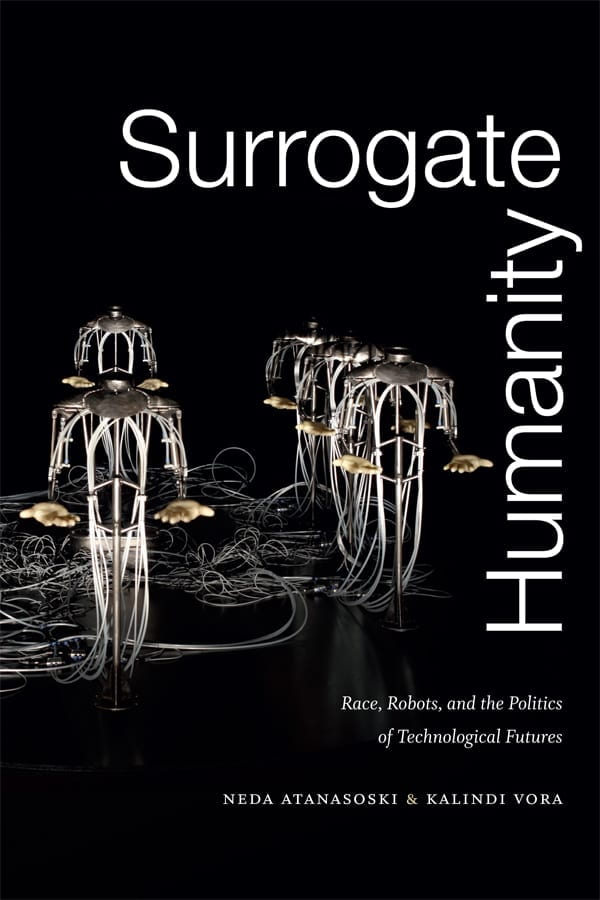
Surrogate Humanity: Race, Robots, and the Politics of Technological Futures (Duke University Press, March 2019)
On December 04, 2019 in Engineering 2-599, with Critical Race and Ethnic Studies and The Humanities Institute, the SJRC helped the authors celebrate at a book launch. In Surrogate Humanity (Duke University Press, March 2019), Science & Justice Affiliates Neda Atanasoski (UCSC Professor of Feminist Studies and Critical Race and Ethnic Studies) and Kalindi Vora (UC Davis Associate Professor of Gender, Sexuality, and Women’s Studies) trace the ways in which robots, artificial intelligence, and other technologies serve as surrogates for human workers within a labor system entrenched in racial capitalism and patriarchy. Analyzing myriad technologies, from sex robots and military drones to sharing economy platforms, Atanasoski and Vora show how liberal structures of antiblackness, settler colonialism, and patriarchy are fundamental to human-machine interactions as well as the very definition of the human.
Wilted: Pathogens, Chemicals, and the Fragile Future of the Strawberry Industry (UC Press, 2019)

Wilted: Pathogens, Chemicals, and the Fragile Future of the Strawberry Industry (UC Press, 2019)
In her new book, “Wilted: Pathogens, Chemicals, and the Fragile Future of the Strawberry Industry (UC Press, 2019)”, Science & Justice Affiliate, UC Santa Cruz Professor of Social Sciences Julie Guthman tells the story of how the strawberry industry came to rely on soil fumigants, and how that reliance reverberated throughout the rest of the fruit’s production system. The particular conditions of plants, soils, chemicals, climate, and laboring bodies that once made strawberry production so lucrative in the Golden State have now changed and become a set of related threats that jeopardize the future of the industry.
Find out more on what Guthman has to say about the strawberry production regions in California in this campus news article: Strawberries: The tasty fruit with a tainted environmental legacy and an uncertain future.
In May 2020, Professor Guthman and SJTP graduate fellow Erica Zurawaski published If I need to put more armor on, I can’t carry more guns: the collective action problem of breeding for productivity in the California strawberry industry in the International Journal of the Sociology of Agriculture and Food. The paper reports on their ongoing research on the California strawberry industry and discusses why growers continue to want high-yielding varieties. Also in May, Professors Guthman and Fairbairn contributed an opinion piece, Agri‑food tech discovers silver linings in the pandemic, in Agriculture and Human Values as part of a special issue on COVID-19 in which they discuss how the agri-food tech sector, the subject of their NSF-funded research project, has found opportunity in the crisis and has quickly pivoted to food safety as a problem it can solve.
Appendix 5: SJRC Funders
Grants
2019-0112: Comparative Analysis of Interdisciplinary Training for STEM Scholars
Funding Agency: CITRIS and the Banatao Institute at the University of California
Principal Investigator: Jenny Reardon (Primary Sponsor: UC Davis, Kalindi Vora)
Amount: $20,473.50 (UCSC’s portion)
SEES Fellows: Understanding Resilience in a Complex Coupled Human-Natural System: Integrating Qualitative and Quantitative Information and Community-Based Action Research
Funding Agency: National Science Foundation
Principal Investigator: Jenny Reardon (for SJRC Postdoc Melissa Eitzel Solera)
NSF Award No: 1415130; 2014-12/31/2020
Amount: $520,412
The UCSC Center for Orphan-disease Alternative Splicing Therapeutics (COAST)
Funding Agency: UC Santa Cruz center-scale seed funding initiative
Principal Investigator: Michael Stone
Amount: $ $75,000 (Office of Research $60,000) and (Physical and Biological Sciences Dean Koch $15,000)
Toward a Sociology of Bioethics (applied)
Funding Agency: Wellcome Trust Research Development Award in Humanities, Social Science and Bioethics
Principal Investigator: Jenny Reardon (Primary Sponsor: Institute for Advanced Study, Alondra Nelson)
Amount: $487,098 (UCSC’s portion)
Pathways Internship in Sociology and Science, Technology, and Society Studies (applied)
Funding Agency: UC-HBCU Initiative
Principal Investigator: James Doucet-Battle
Amount: $417,869
Major Donors
Robb Mass with GS Gives
Major Sponsors
Department of Sociology
Division of Graduate Studies
Division of Humanities
Division of Physical & Biological Sciences
Division of Social Sciences
The UC Santa Cruz Genomics Institute
SJWG Event Co-Sponsors
ACLU Northern California Santa Cruz County Chapter
Baskin Engineering Council on Diversity, Equity, and Inclusion
College Nine
College Ten
Critical Race and Ethnic Studies
Crown College
Department of Anthropology
Department of Feminist Studies
Department of History of Consciousness
Department of Sociology
Inner Light Ministries
NAACP of Santa Cruz County
Santa Cruz County Sheriff’s Office
The American Indian Resource Center
The Center for Cultural Studies
The Center for Racial Justice
The Human Paleogenomics Lab
The Humanities Institute
The Institute for Genomic Biology at the University of Illinois at Urbana-Champaign
The UC Santa Cruz Genomics Institute
The UC Santa Cruz Institute for Social Transformation
UCSC Women in Science and Engineering
Major SJRC Co-Sponsored Events
Forensic Genomics for Investigators P.O.S.T. Course (Santa Cruz County Sheriff’s Office)
Frankencon 2019 (Department of Theater Arts)
Looking for Marla’s Bilingual Book Launch (City of Santa Cruz)
Appendix 6: SJRC 2019-2020 Org Chart
SJRC Org Chart 2019-2020 (PDF)
Appendix 7: SJRC Faculty Affiliates at UC Santa Cruz
The Science & Justice Research Center (SJRC) partners with multiple regional and international units to provide a discipline-neutral space to freely express and address areas of common concern through facilitated discussions, student exchanges, research, and training. Find out more about how affiliates support the Center.
UCSC Affiliated Faculty
SJRC Affiliated Faculty add to the liveliness of the S&J Community.
Elliot Anderson, Art
Hillary Angelo, Sociology
Neda Atanasoski, Feminist Studies
Karen Barad, Feminist Studies, History of Consciousness, and Philosophy
Chris Benner, Environmental Studies, Sociology
Micha Cárdenas, Art and Design: Games and Playable Media
Nancy Chen, Anthropology
Sharon Daniel, Film & Digital Media
Jennifer Derr, History
Lindsey Dillon, Sociology
James Doucet-Battle, Sociology
Madeleine Fairbairn, Environmental Studies
Lise Getoor, Computer Science
Herman Gray, Sociology
Julie Guthman, Community Studies
Kathleen (Kat) Gutierrez, History
Camilla Hawthorne, Sociology
Dee Hibbert-Jones, Digital Art and New Media
Zia Isola, Center for Biomolecular Science & Engineering
Andrew Mathews, Anthropology
Jaimie Morse, Sociology
Maya Peterson, History
Tamara Pico, Earth and Planetary Sciences
Jenny Reardon, Sociology
Warren Sack, Digital Arts and New Media
Beth Shapiro, Ecology and Evolutionary Biology
Matt Sparke, Politics
Beth Stephens, Art, E.A.R.T.H. Lab
Susan Strome, Molecular Cell & Developmental Biology
Anna Tsing, Anthropology
Anjuli Verma, Politics
UCSC Steering Committee
Members of the SJRC Steering Committee serve for 1 academic year (renewable). The committee advises the Center on its research, community involvement, programing, and building the Science and Justice platform. It also reviews committee members and assignments, the Center’s research themes, events, visiting scholars, and steers the Center’s overall programing. The committee meets twice per term.
Jennifer Derr, History
James Doucet-Battle, Sociology
Lise Getoor, Computer Science
Jenny Reardon, Sociology
Jaimie Morse, Sociology
Matt Sparke, Politics
Internal Advisory Board
Members of the SJRC Advisory Board serve for 3 academic years (renewable).Board members advise the Center on institutional support and fundraising, cultivate connections and synergy amongst partners, and help forge the overall Center vision and plans. The Board meets annually in Spring.
Elliot Anderson, Art
Karen Barad, Professor of Feminist Studies
Nancy Chen, Anthropology
Herman Gray, Sociology
Ed Green, Biomolecular Engineering
Zia Isola, Center for Biomolecular Science & Engineering
Jaimie Morse, Sociology
Warren Sack, Digital Arts & New Media
Matt Sparke, Politics
Anna Tsing, Anthropology
External Advisory Board
Geoffrey Bowker, Bioinformatics, University of California – Irvine
Joe Dumit, Anthropology, University of California – Davis
Sally Lehrman, SJRC Visitor
Laura Mamo, Health Equity Institute, San Francisco State University
Safiya Umoja Noble, Information Studies, University of California – Los Angeles
Janet Shim, School of Nursing, University of California – San Francisco
Kim TallBear, Native Studies, University of Alberta, Canada
Fred Turner, Communications, Stanford
Appendix 8: SJRC Key Accomplishments
Key Accomplishments (eg: external and internal funding, grants, press coverage, research collaborations) can be found here.

